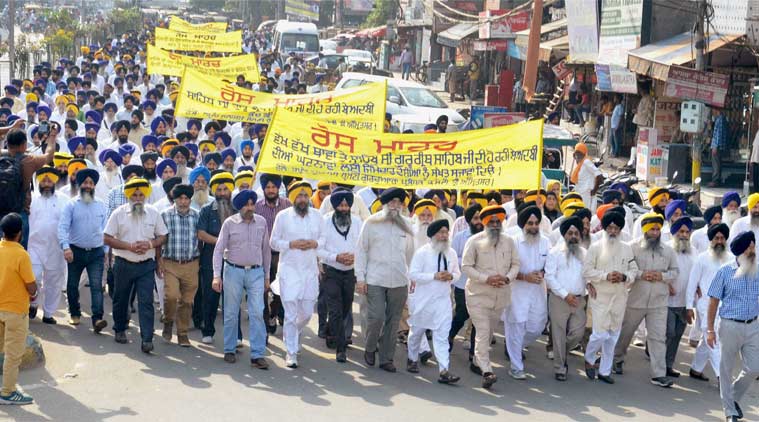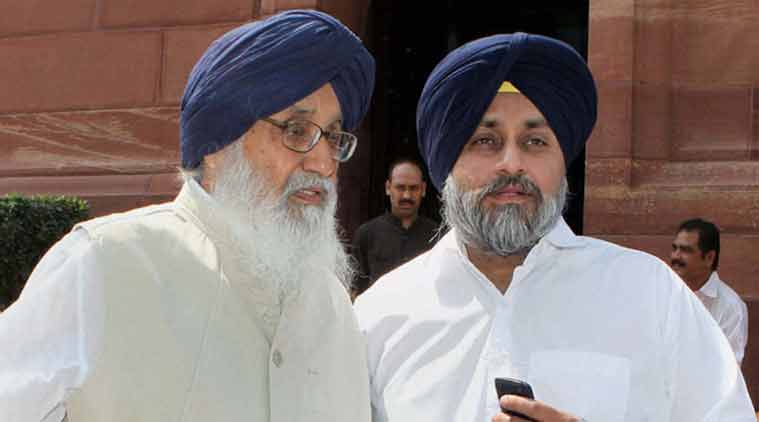Stay updated with the latest - Click here to follow us on Instagram
Punjab Holy Book sacrilege: ‘Panthic’ Chief Minister ensnared in Panthic unrest
The chief minister has been one of the strongest votaries of Panthic politics in Punjab.
 Punjab Chief Minister Parkash Singh Badal.
Punjab Chief Minister Parkash Singh Badal.
Barely had the Shiromani Akali Dal (SAD)-Bharatiya Janata Party (BJP) government in Punjab recovered from the debilitating farmers’ unrest which had resulted in a railway blockade for six days, that it was caught unawares with a series of desecrations of the Guru Granth Sahib, the holy book of the Sikhs, at multiple places in Punjab.
The farmers’ agitation had also caught Chief Minister Parkash Singh Badal on the back foot as the government machinery failed to read the level of unrest which existed amongst the farmers in the state. However, the potentially dangerous law and order situation emanating from the religious sacrilege had connotations way beyond the farmers’ blockade, and here again, the Punjab government was caught napping.
[related-post]
The series of sacrileges came close on the heels of a pardon which had been granted by the Jathedar of the Akal Takht, the highest temporal seat of the Sikhs, in the Golden Temple, Amritsar, to the controversial head of Dera
Sacha Sauda, Gurmit Ram Rahim Singh Insaan. The Dera chief had invited the ire of the Sikh community when in May 2007 he appeared in an advertisement wearing a dress similar to that worn by the Tenth Sikh Guru, Guru Gobind Singh. However, the pardon given to the Dera chief had been strongly criticised by radical Sikh groups and the Akali Dal was roundly criticised for having allegedly engineered the pardon.
 Amritsar: Members of SGPC ( Shiromani Gurdwara Parbandhak Committee) take out a march during their protest against the alleged desecration of religious book and Punjab firing incident in Amritsar on Saturday. (Source: PTI)
Amritsar: Members of SGPC ( Shiromani Gurdwara Parbandhak Committee) take out a march during their protest against the alleged desecration of religious book and Punjab firing incident in Amritsar on Saturday. (Source: PTI)
Initially, the desecration of the Holy Book was linked to Dera supporters by protesting Sikhs, but the subsequent police investigation has ruled out any Dera hand and has instead focussed on NRI Sikhs based in other countries for funding the unrest.
On its part, the SAD, led by its president and state Deputy Chief Minister Sukhbir Singh Badal had calculated that the massive Dera voter base would help it win the assembly elections due in February 2017 but it miscalculated the negative reaction among the rural Sikhs.
However, it was the strong use of force on the Sikhs protesting against the sacrilege which snowballed into a major confrontation between Sikh protestors and the state police force, all across the state. The police firing on a group of protestors resulted in the death of two of them and injuries to many – the angered Sikhs proceeded to block traffic on highways across the state.
 The chief minister has been one of the strongest votaries of Panthic politics in Punjab and the fact that it was a Panthic issue which caught him and his government unawares is unexpected. Clearly, the implications of the pardon to the Dera chief, and the possibility of mischievous elements fomenting unrest, had not been fully appreciated by the Akalis. The result has been this severe backlash.
The chief minister has been one of the strongest votaries of Panthic politics in Punjab and the fact that it was a Panthic issue which caught him and his government unawares is unexpected. Clearly, the implications of the pardon to the Dera chief, and the possibility of mischievous elements fomenting unrest, had not been fully appreciated by the Akalis. The result has been this severe backlash.
Within the Akali Dal, murmurs of mishandling of the protests against the sacrilege have begun. However, no senior leader has so far come out openly against the Badals. Yet, the spate of resignations from official positions of the Shiromani Gurdwara Parbandhak Committee (SGPC), which is virtually controlled by SAD, shows that intra-party unrest is rife.
The setback suffered by the Akalis through the Dera controversy as well as the sacrilege, for their pro-Panthic image, has been immense. Their image as protectors of the Sikh identity in the political domain has been dented and even though the rival political parties, Congress and Aam Aadmi Party (AAP) have not been able to fully exploit the issue, the effects of this mishandling of situation will be reflected in the 2017 vidhan sabha polls.







